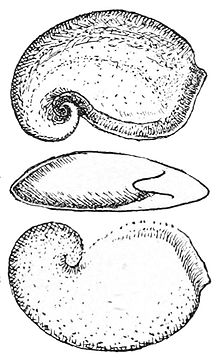Helcionelloida
| Helcionelloida Temporal range:
| |
|---|---|

| |
| Latouchella costata | |
| Scientific classification | |
| Domain: | Eukaryota |
| Kingdom: | Animalia |
| Phylum: | Mollusca |
| Subphylum: | Conchifera |
| Class: | †Helcionelloida Peel, 1991 |
| Orders | |
and see text | |


Helcionelloida is an extinct group of ancient molluscs (phylum Mollusca). These are the oldest known conchiferan molluscs, that is, they had a mineralised shell. Some members of this class were mistaken for Monoplacophorans. The class was erected by Peel in 1991.[1]
Anatomy
These animals were untorted and they had a coiled, cone-shaped shell. The majority of species were small (shells being about two millimeters in length and or diameter). Modern reconstructions depict them as resembling snails. The shells of some genera, particularly Yochelcionella, also possessed a "snorkel"-like opening which was most likely used for breathing.
2005 taxonomy
The taxonomy of the Gastropoda by Bouchet & Rocroi, 2005[2] categorizes members of this taxon within the Paleozoic molluscs of uncertain systematic position, but that taxonomy to not use the name Helcionelloida.
2006-2007 taxonomy
Taxonomy of helcionelloid according to the opinion of P. Yu. Parkhaev:[3][4]
Gastropoda Cuvier, 1797
Subclass Archaeobranchia Parkhaev, 2001
- Order Helcionelliformes Golikov & Starobogatov, 1975
- Superfamily Helcionelloidea Wenz, 1938
- Family Helcionellidae Wenz, 1938
- Family Igarkiellidae Parkhaev, 2001
- Family Coreospiridae Knight, 1947
- Superfamily Yochelcionelloidea Runnegar & Jell, 1976
- Family Trenellidae Parkhaev, 2001
- Family Yochelcionellidae Runnegar & Jell, 1976
- Family Stenothecidae Runnegar & Jell, 1980
- Subfamily Stenothecinae Runnegar & Jell, 1980
- Subfamily Watsonellinae Parkhaev, 2001
- Order Pelagiellifomes MacKinnon, 1985
- Family Pelagiellidae Knight, 1952
- Family Aldanellidae Linsley et Kier, 1984
Subclass Divasibranchia Minichev & Starobogatov, 1975
- Order Khairkhaniiformes Parkhaev, 2001
- Family Khairkhaniidae Missarzhevsky, 1989
Subclass Dextrobranchia Minichev & Starobogatov, 1975
- Order Onychochiliformes Minichev & Starobogatov, 1975
- Family Onychochilidae Koken, 1925
References
- ^ Peel, J. S. (1991). "Functional Morphology of the Class Helcionelloida Nov., and the Early Evolution of the Mollusca". In Simonetta, A. M.; Conway Morris, S (eds.). The Early Evolution of Metazoa and the Significance of Problematic Taxa. Cambridge University Press. pp. 157–177. ISBN 978-0-521-40242-2.
- ^ Bouchet P. & Rocroi J.-P. (Ed.); Frýda J., Hausdorf B., Ponder W., Valdes A. & Warén A. 2005. Classification and nomenclator of gastropod families. Malacologia: International Journal of Malacology, 47(1-2). ConchBooks: Hackenheim, Germany. ISBN 3-925919-72-4. ISSN 0076-2997. 397 pp. http://www.vliz.be/Vmdcdata/imis2/ref.php?refid=78278
- ^ P. Yu. Parkhaev (2006) "Adaptive radiation of the Cambrian helcionelloid mollusks (Gastropoda, Archaeobranchia). Archived 2015-06-10 at the Wayback Machine" In: S.V. Rozhnov (ed.) "Evolution of the biosphere and biodiversity. Towards the 70th anniversary of A. Y. Rozanov". 2006. Moscow, pp. 282-296.
- ^ P. Yu. Parkhaev (2007). "The Cambrian 'basement' of gastropod evolution". Geological Society, London, Special Publications. 286: 415–421. doi:10.1144/SP286.31.
External links
- Atkins C. J. & Peel J. S. (2008). "Yochelcionella (Mollusca, Helcionelloida) from the lower Cambrian of North America". Bulletin of Geosciences 83(1): 23-38 (8 figures). doi:10.3140/bull.geosci.2008.01.023. - slightly different taxonomic placement of Yochelcionellidae.
- https://web.archive.org/web/20080930105735/http://www.palaeos.com/Invertebrates/Molluscs/BasalMollusca/Conchifera/Helcionelloida.html
